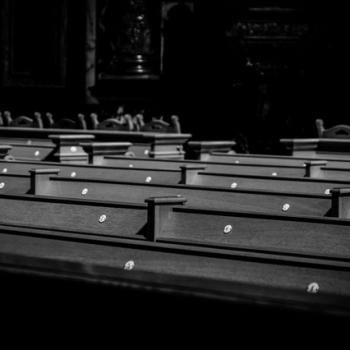Some of my best friends and favorite people in the world are introverts. You wouldn’t know it to look at them.
Contrary to popular belief, an introvert is not necessarily shy (though some are). The introvert/extrovert dynamic has less to do with the ability to engage, and more to do with how we are wired, and where we most draw our energy. Extroverts are energized by conversation and external stimulation. Introverts, though they might enjoy a lively conversation at times, are often drained by external stimuli. They draw their strength and energy from a more internal place, and after a few hours at a party or too much people-ing, they need to stare at the wall for a few hours to recover.
Did I get it?

In my life as a pastor, I often have conversations with people who feel there is “no place” for them in the church. Or at least, no obvious place. Yes, they worship, they know people, they pitch in and help where it is needed. But I sometimes hear people, even long-time members, articulate a feeling of isolation. A sense that they do not precisely “belong” or know where they might best serve, or how to find the group or opportunity that would best help them grow.
I’m always surprised to hear this. And for the most part, my typical response has been a litany of programs, mission opportunities and community needs. Sign up for this! Join this! Fill this role! I have a place for everyone and an answer for everything!
Finally, a couple of years ago, one man responded to this approach by saying, point blank: “The problem is … church is mostly for extroverts.”
I realized he’s not entirely wrong. That I was responding to his need for place and purpose as an extrovert, with a list of extroverted activities and roles.
And so it has come to my attention, in recent years, that most Churches—in the most organizational sense of the word—are designed by and for extroverts. While I know plenty of pastors who are introverts, in the ‘where I am energized’ sense, the programs and ministries and rhythms of communal life all require a great deal of outward work for those leading, as well as those participating. Congregations, then, become creatures of external drive … created by extroverts, for extroverts. Or at least, by introverts who are performing extroverted functions in at least part of their role. Even if half of our clergy and half the folks in the pews (chairs) are introverts, “Church” is an outward-reaching thing. But I’m becoming increasingly aware that this can be a problem for inwardly driven people.

On the one hand, I think the sense of isolation I often hear folks articulate is a product of our larger culture, and not the church itself. We live in a time when independence and autonomy are valued above community and connection. Our lives are increasingly online, our connections obscured by drive-through windows, backyard fences and automated garage doors. We are first consumers, citizens second. Of course we are lonely! It is by design. The great Capitalism machine likes us to be lonely, because lonely people buy more stuff.
The Church is not utterly responsible for that dynamic, nor can church alone fix it. And yet, I wonder if a mindfulness about the ways we invite people to connect can help us shift some elements of communal life, and by extension, the culture at large. While we should never try to be all things to all people, we should still be about the work of building a diverse and life-giving community. And by “diverse,” we can’t just mean age, race, gender and economic status. I’ve learned that to be truly diverse, we need also consider people’s various ways of engaging the world, and the need for various kinds of connection.
I don’t entirely know what introvert-sensitive church culture looks like. But I do know that since having awareness of the struggle, I think differently about the invitations we extend, the spaces we create, and even the language that we use in talking about meaningful community.
Here are a few questions that might be helpful for church leaders who want to think critically about these dynamics:
Are we providing as many spaces for inward spiritual growth as we are for fellowship and outward connection?
What are some meaningful ways for people to serve and give, even if they don’t want to be ‘up front’ leading or addressing a group?
Does our worship culture feel like performance/entertainment, or authentic celebration? How do we seek balance there?
Are there ways for people to spend meaningful time together without necessarily having to talk? Are there ways to be engaged without having to engage in conversation?
What else? What are your experiences as either a leader or participant? I’d love to hear more about what people find off-putting and what you find meaningful.
Also, what do your communities do to make sure no one feels alone in your midst?












